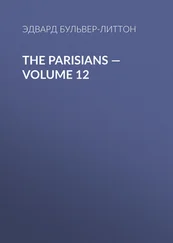Эдвард Бульвер-Литтон - Paul Clifford — Volume 03
Здесь есть возможность читать онлайн «Эдвард Бульвер-Литтон - Paul Clifford — Volume 03» — ознакомительный отрывок электронной книги совершенно бесплатно, а после прочтения отрывка купить полную версию. В некоторых случаях можно слушать аудио, скачать через торрент в формате fb2 и присутствует краткое содержание. Жанр: foreign_prose, literature_19, Европейская старинная литература, foreign_antique, на английском языке. Описание произведения, (предисловие) а так же отзывы посетителей доступны на портале библиотеки ЛибКат.
- Название:Paul Clifford — Volume 03
- Автор:
- Жанр:
- Год:неизвестен
- ISBN:нет данных
- Рейтинг книги:4 / 5. Голосов: 1
-
Избранное:Добавить в избранное
- Отзывы:
-
Ваша оценка:
- 80
- 1
- 2
- 3
- 4
- 5
Paul Clifford — Volume 03: краткое содержание, описание и аннотация
Предлагаем к чтению аннотацию, описание, краткое содержание или предисловие (зависит от того, что написал сам автор книги «Paul Clifford — Volume 03»). Если вы не нашли необходимую информацию о книге — напишите в комментариях, мы постараемся отыскать её.
Paul Clifford — Volume 03 — читать онлайн ознакомительный отрывок
Ниже представлен текст книги, разбитый по страницам. Система сохранения места последней прочитанной страницы, позволяет с удобством читать онлайн бесплатно книгу «Paul Clifford — Volume 03», без необходимости каждый раз заново искать на чём Вы остановились. Поставьте закладку, и сможете в любой момент перейти на страницу, на которой закончили чтение.
Интервал:
Закладка:
Certainly at that moment, what with the fresh air, the fitful moonlight now breaking broadly out, now lost in a rolling cloud, the exciting exercise, and that racy and dancing stir of the blood, which all action, whether evil or noble in its nature, raises in our veins; what with all this, we cannot but allow the fascination of that lawless life,— a fascination so great that one of the most noted gentlemen highwaymen of the day, one too who had received an excellent education and mixed in no inferior society, is reported to have said, when the rope was about his neck, and the good Ordinary was exhorting him to repent of his ill- spent life, "Ill-spent, you dog! 'Gad!" (smacking his lips) "it was delicious!"
"Fie! fie! Mr. ———-, raise your thoughts to Heaven!"
"But a canter across the common—oh!" muttered the criminal; and his soul cantered off to eternity.
So briskly leaped the heart of the leader of the three that, as they now came in view of the main road, and the distant wheel of a carriage whirred on the ear, he threw up his right hand with a joyous gesture, and burst into a boyish exclamation of hilarity and delight.
"Whist, captain!" said Ned, checking his own spirits with a mock air of gravity, "let us conduct ourselves like gentlemen; it is only your low fellows who get into such confoundedly high spirits; men of the world like us should do everything as if their hearts were broken."
"Melancholy ever cronies with Sublimity, and Courage is sublime," said Augustus, with the pomp of a maxim-maker.
[A maxim which would have pleased Madame de Stael, who thought that philosophy consisted in fine sentiments. In the "Life of Lord Byron," just published by Mr. Moore, the distinguished biographer makes a similar assertion to that of the sage Augustus: "When did ever a sublime thought spring up in the soul that melancholy was not to be found, however latent, in its neighbourhood?" Now, with due deference to Mr. Moore, this is a very sickly piece of nonsense, that has not even an atom of truth to stand on. "God said, Let there be light, and there was light!"—we should like to know where lies the melancholy of that sublime sentence. "Truth," says Plato, "is the body of God, and light is his shadow." In the name of common-sense, in what possible corner in the vicinity of that lofty image lurks the jaundiced face of this eternal bete noir of Mr. Moore's? Again, in that sublimest passage in the sublimest of the Latin poets (Lucretius), which bursts forth in honour of Epicurus, is there anything that speaks to us of sadness? On the contrary, in the three passages we have referred to, especially in the, two first quoted, there is something splendidly luminous and cheering. Joy is often a great source of the sublime; the suddenness of its ventings would alone suffice to make it so. What can be more sublime than the triumphant Psalms of David, intoxicated as they are with an almost delirium of transport? Even in the gloomiest passages of the poets, where we recognize sublimity, we do not often find melancholy. We are stricken by terror, appalled by awe, but seldom softened into sadness. In fact, melancholy rather belongs to another class of feelings than those excited by a sublime passage or those which engender its composition. On one hand, in the loftiest flights of Homer, Milton, and Shakspeare, we will challenge a critic to discover this "green sickness" which Mr. Moore would convert into the magnificence of the plague. On the other hand, where is the evidence that melancholy made the habitual temperaments of those divine men? Of Homer we know nothing; of Shakspeare and Milton, we have reason to believe the ordinary temperament was constitutionally cheerful. The latter boasts of it. A thousand instances, in contradiction to an assertion it were not worth while to contradict, were it not so generally popular, so highly sanctioned, and so eminently pernicious to everything that is manly and noble in literature, rush to our memory. But we think we have already quoted enough to disprove the sentence, which the illustrious biographer has himself disproved in more than twenty passages, which, if he is pleased to forget, we thank Heaven posterity never will. Now we are on the subject of this Life, so excellent in many respects, we cannot but observe that we think the whole scope of its philosophy utterly unworthy of the accomplished mind of the writer; the philosophy consists of an unpardonable distorting of general truths, to suit the peculiarities of an individual, noble indeed, but proverbially morbid and eccentric. A striking instance of this occurs in the laboured assertion that poets make but sorry domestic characters. What! because Lord Byron is said to have been a bad husband, was (to go no further back for examples)—was Walter Scott a bad husband, or was Campbell, or is Mr. Moore himself? why, in the name of justice, should it be insinuated that Milton was a bad husband, when, as far as any one can judge of the matter, it was Mrs. Milton who was the bad wife? And why, oh! why should we be told by Mr. Moore,—a man who, to judge by Captain Rock and the Epicurean, wants neither learning nor diligence,—why are we to be told, with peculiar emphasis, that Lord Bacon never married, when Lord Bacon not only married, but his marriage was so advantageous as to be an absolute epoch in his career? Really, really, one begins to believe that there is not such a thing as a fact in the world!]
"Now for the hedge!" cried Lovett, unheeding his comrades; and his horse sprang into the road.
The three men now were drawn up quite still and motionless by the side of the hedge. The broad road lay before them, curving out of sight on either side; the ground was hardening under an early tendency to frost, and the clear ring of approaching hoofs sounded on the ear of the robbers, ominous, haply, of the chinks of "more attractive metal" about, if Hope told no flattering tale, to be their own.
Presently the long-expected vehicle made its appearance at the turn of the road, and it rolled rapidly on behind four fleet post-horses.
"You, Ned, with your large steed, stop the horses; you, Augustus, bully the post-boys; leave me to do the rest," said the captain.
"As agreed," returned Ned, laconically. "Now, look at me!" and the horse of the vain highwayman sprang from its shelter. So instantaneous were the operations of these experienced tacticians, that Lovett's orders were almost executed in a briefer time than it had cost him to give them.
The carriage being stopped, and the post-boys white and trembling, with two pistols (levelled by Augustus and Pepper) cocked at their heads, Lovett, dismounting, threw open the door of the carriage, and in a very civil tone and with a very bland address accosted the inmate.
"Do not be alarmed, my lord, you are perfectly safe; we only require your watch and purse."
"Really," answered a voice still softer than that of the robber, while a marked and somewhat French countenance, crowned with a fur cap, peered forth at the arrester,—"Really, sir, your request is so modest that I were worse than cruel to refuse you. My purse is not very full, and you may as well have it as one of my rascally duns; but my watch I have a love for, and—"
"I understand you, my lord," interrupted the highwayman. "What do you value your watch at?"
"Humph! to you it may be worth some twenty guineas."
"Allow me to see it!"
"Your curiosity is extremely gratifying," returned the nobleman, as with great reluctance he drew forth a gold repeater, set, as was sometimes the fashion of that day, in precious stones. The highwayman looked slightly at the bauble.
"Your lordship," said he, with great gravity, "was too modest in your calculation; your taste reflects greater credit on you. Allow me to assure you that your watch is worth fifty guinea's to us, at the least. To show you that I think so most sincerely, I will either keep it, and we will say no more on the matter; or I will return it to you upon your word of honour that you will give me a check for fifty guineas payable, by your real bankers, to 'bearer for self.' Take your choice; it is quite immaterial to me!"
Читать дальшеИнтервал:
Закладка:
Похожие книги на «Paul Clifford — Volume 03»
Представляем Вашему вниманию похожие книги на «Paul Clifford — Volume 03» списком для выбора. Мы отобрали схожую по названию и смыслу литературу в надежде предоставить читателям больше вариантов отыскать новые, интересные, ещё непрочитанные произведения.
Обсуждение, отзывы о книге «Paul Clifford — Volume 03» и просто собственные мнения читателей. Оставьте ваши комментарии, напишите, что Вы думаете о произведении, его смысле или главных героях. Укажите что конкретно понравилось, а что нет, и почему Вы так считаете.












